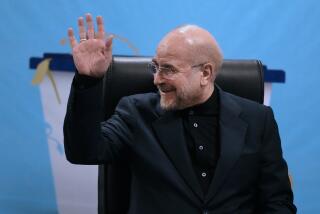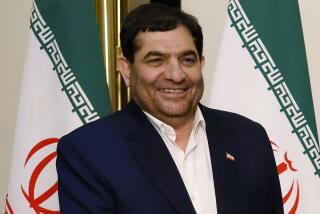Iran opposition leader’s offices raided
- Share via
Reporting from Tehran and Beirut — A recent government raid on the offices of an Iranian opposition leader suggests that authorities may be preparing to haul the leaders of the country’s reform movement into court, analysts said.
Security forces stormed the office of former prime minister and 2009 presidential candidate Mir-Hossein Mousavi late Wednesday, confiscating documents and computers. The Iranian Revolutionary Guard also reportedly removed Mousavi’s bodyguards, some of whom have been with him for years, and replaced them with new ones from their own ranks.
News of the raid was published Thursday on Mousavi’s Kaleme news website .
Earlier this month the home of another opposition leader, Mehdi Karroubi, was raided, just before the state-sponsored Quds Day celebrations in support of the Palestinian cause. About 50 militiamen dressed in civilian clothes reportedly threw stones at the residence of the former parliament speaker, dismantled security cameras and splashed paint on the walls.
Both Mousavi and Karroubi ran in last year’s presidential election and the government has accused them of fomenting “sedition” after they led a series of protests over the disputed vote that coalesced into the Green Movement.
On Thursday, the Mehr news agency quoted prosecutor Abbas Jafari-Dolatabadi as saying Karroubi and Mousavi would be put on trial “once public opinion is ready.”
Analysts say they doubt authorities would arrest and imprison the two opposition leaders, but they may decide to tie them up in legal proceedings.
The raid on Mousavi’s office “cannot be considered a prelude to something more serious such as arrest,” said Reza Kavian, a Tehran political analyst. “The hardliners want to intimidate him.”
Authorities appear to be increasing pressure on Mousavi and Karroubi, with both reporting increased harassment by security forces stationed outside their homes and offices. Posts on Mousavi’s website and Facebook page, which is run by a supporter in Germany, report that anyone who comes to see him is questioned and forced to sign a paper promising not to return.
The renewed crackdown coincided with the start of the holy month of Ramadan in mid-August and may have been motivated by fear that traditional holiday gatherings could be used to mobilize the opposition. Supreme leader Ayatollah Ali Khamenei recently blamed opposition leaders for Iran’s lack of economic progress and diplomatic troubles over the last year, but did not identify them by name.
“Those who started the [2009] sedition … dealt a heavy blow to the affairs of the country,” he said in a statement broadcast by state-run TV. “Had it not been for this sedition, various affairs of the country would have made better progress. They made the enemies hopeful and lifted hopes in those who are against the Islamic system and have formed a front.”
Despite his anger, experts say Khamenei is reluctant to try to arrest the opposition figures and make them into heroes.
“The supreme leader does not want them … to be arrested at this juncture,” Ahmad Bakhshayesh, a Tehran political scientist who teaches at Azad University, told The Times. “The hard-liners want to encourage Mousavi and Karroubi to show their enmity with the supreme leader, but Mousavi and Karrubi are cautious enough not to give them an excuse. “
Mostaghim reported from Tehran and Lutz from Beirut.
More to Read
Sign up for Essential California
The most important California stories and recommendations in your inbox every morning.
You may occasionally receive promotional content from the Los Angeles Times.











